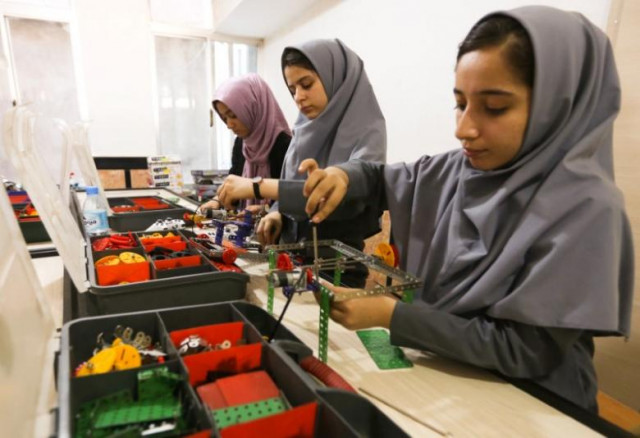Pakistan has friends in Kabul
The Afghans who come to Pakistan find Pakistan economically affordable as compared to other countries in the region

PHOTO: REUTERS
Here are the facts: in terms of social relations, every day between 2,000 to 3,000 visas are issued from Kabul alone to Pakistan. The numbers of visas issued from the rest of Pakistani consulates are additional, that may vary from 800 to 1,000 as per Pakistani officials. The Afghans who travel on these visas are usually travelling for health and educational reasons. The patients who travel to Pakistan feel more comfortable in Pakistan than any other country. The reasons being obvious, most of them share the same culture, language, religion and most of the times clans and tribes as well. Also that many of them have been frequently travelling to Pakistan for the last many years. Majority of them have their families in Pakistan that either migrated during the Soviet-Afghan war or later during the last decade. These Afghans who come to Pakistan also find Pakistan economically affordable as compared to other countries in the region. It is to be kept in mind that most of the Afghans live in abject poverty and lack basic health facilities. Therefore, Pakistan is the logical and economical option.
Kabul taking steps to cut peace deal with Pakistan: Ghani
Interestingly almost every third person that I met, Dari (Persian spoken in Afghanistan) dominated, Kabul could speak and understand Urdu. Most of the people who could speak Urdu were young Afghans. They had either been educated or had spent considerable time doing jobs in Pakistan. They have good memories attached to the neighbouring country which welcomed and hosted them.
After meeting the young Afghans, I realised that when it comes to Pakistan-Afghanistan relations, higher education is Pakistan’s strength. While Pakistan has itself improved the quality of higher education, it has worked on giving scholarships to Afghan students who want to pursue their academic ambitions. Islamabad is generally multi-linguistic city and multi-ethnic as well. One can find Hazaras, Persian speaking, and Pakhtuns in large numbers in different universities of the capital. This naturally gives the Afghan students a conducive environment to blend in.
Last year the Higher Education Commission announced scholarships to 3,000 Afghan students and a large number of those are females. These young students are the bridges and ambassadors of peace between Pakistan and Afghanistan, and a huge potential for the future of democracy and peace in Afghanistan. The tapping of this potential needs the Foreign Office’s attention now more than ever.
A lot of Pakistanis are concerned about anti-Pakistan sentiments brewing in Kabul. The concerns are, no doubt, justified and show Pakistan’s concern and urge to improve its relations with the people of Afghanistan. After all, Pakistan has hosted millions of Afghan refugees over the decades and expects that the refugees become the ambassadors of goodwill between the two countries when they return to their home country. For that Pakistan too needs consideration on smooth transition of refugees from Pakistani soil to Afghanistan. It doesn’t need to be rough and loaded with blame. That ruins the very spirit with which Pakistan hosted them for decades.
In Kabul, the sentiments regarding Pakistan are mixed. The anti-Pakistan sentiment propaganda is over-blown and exaggerated. There are many people, especially young, who want to have better relations with Pakistan. The anti-Pakistan sentiment, which cannot be outrightly denied, but certainly does not require exaggeration, needs careful consideration.
The people who become a part of small anti-Pakistan rallies in Kabul and surroundings are usually funded and supported by the local intelligence agencies, foreign-funded groups and few local political factions which work for their vested interests. The majority is not the part of it. If things are overlooked the anti-Pakistan sentiment has the potential to be exploited by those that Pakistan has been wary of. So what should be done?
Kabul urges Pakistani Ulema role in ending Afghan war
Proactive diplomacy is the answer. The areas of convergence between Pakistan and Afghanistan are many. The Afghan youth and the parliamentarians who have spent years in Pakistan are the probable saviours of the day. Terrorism, extremism and hatred are common enemies. That can be overcome by devising and speeding up the Foreign Office’s well-planned outreach programmes. Though the Pakistan Embassy in Kabul and consulates elsewhere in Afghanistan are active, it is in Pakistan’s national interest to have a proactive approach in reaching out to the youth in Afghanistan.
Published in The Express Tribune, January 25th, 2018.
Like Opinion & Editorial on Facebook, follow @ETOpEd on Twitter to receive all updates on all our daily pieces.














COMMENTS
Comments are moderated and generally will be posted if they are on-topic and not abusive.
For more information, please see our Comments FAQ